Confirmed speakers
– Dr. Karine Alvarez , Université Aix-Marseille , France
Addressing current challenges in antiviral therapies against emerging RNA viruses
– Prof. Jose I. Borrell, Universitat Ramon Llull, Barcelona, Spain
Pyrido[2,3-d]pyrimidin-7(8H)-ones: A Convenient Scaffold for the Synthesis of Bioactive Compounds
– Prof. Philipp Klahn, University of Gothenburg, Sweden
Mimicking nature’s design – From antimicrobial siderophore-drug conjugates and artificial glucosinolates
– Prof. Philippe Loiseau, Université Paris Saclay, France
Drug discovery approaches targeting the parasite or the host cell in the treatment of leishmaniasis
– Prof. Jose Marco-Contelles, IQOG-CSIC, Madrid, Spain
Contilisant, a small molecule designed for Alzheimer’s disease therapy
– Prof. Maria M. M. Santos, University of Lisboa, Portugal
Development of a new generation of p53 activators to tackle cancer
– Prof. Gianluca Sbardella, University of Salerno, Italy
The long and winding road: discovering and validating protein arginine methyltransferase inhibitors
– Prof. Anne Sophie Voisin-Chiret, Université de Caen Normandie, France
Emerging approaches to targeted protein degradation for an innovative drug discovery strategy
CVs in Brief…
| Dr. Karine Alvarez Université Aix-Marseille , France  | Karine Alvarez obtained a PhD in 1999 in Bio-organic chemistry at the university of Montpellier II. After a post-doc position in the chemistry department in Barcelona University, she joined the structural biology laboratory AFMB (Architecture and Functions of Biological Macromolecules) in Aix-Marseille University in 2001 as a CNRS research scientist (Institut de Chimie – INC, section 16). She is currently Directrice de Recherche. She is the Head of the “Antiviral Medicinal Chemistry” thematic group (5 people) in the team “Viral Replicases: Structure, Mechanism and Drug-design”, led by Dr B. CANARD. Her research area is the development in a multidisciplinary environment of antiviral molecules against human pathogenic viruses as HIV, HCV, HEV, Dengue virus, LCMV, LACV, SARS-Cov-2 and tools to better understand the replicative machinery of these viruses. She has specialized in the field of antivirals, nucleos(t)ides and phosphorylated effectors. She also developed biophysical and enzymatic screening assays. Since the beginning of her career, she has been involved in the funding and supervision of her research with more than 20 grants and projects funded and 40 people supervised. She was awarded the bronze medal of the CNRS chemistry institute in 2011. She is the author of 55 publications |
| Prof. Jose I. Borrell Universitat Ramon Llull, Barcelona, Spain 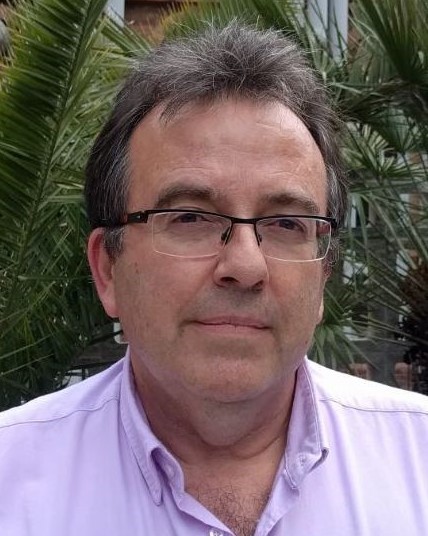 | José I. Borrell studied Chemical Engineering with Organic Chemistry at Institut Químic de Sarrià (IQS), Barcelona, and received his PhD from the same institute. After a postdoctoral experience in a Pharmaceutical company in Barcelona, he joined IQS as an Assistant professor in 1987. Since then, he focused his research on the design and synthesis of compounds with potential biological activity in the field of Medicinal Chemistry. In 1994 he became Full Professor at IQS School of Engineering, a founding member of the Universitat Ramon Llull (URL) the first private University in Catalonia. He has been the creator and first coordinator of the Master in Pharmaceutical Chemistry and a member of the board that created the Bachelor in Pharmacy of URL. His research interests are focused, on the one hand, on the development of rapid synthetic methodologies (microwave-assisted) for the synthesis of pyrido[2,3-d]pyrimidine systems with up to 5 diversity centers and, secondly, in the synthesis of tetraamine systems. Thus, pyrido[2,3-d]pyrimidine systems allowed the synthesis and patent of hepatitis-C inhibitors and tyrosine kinase inhibitors as potential antineoplastic agents. The incorporation of computational methodologies for the design selection of compounds allowed his group to increase the possibilities of access to molecules with high biological activity, as seen in patents and licensing of compounds made. The most recent projects were aimed at the design and synthesis of compounds with antitumor potential. The RTI2018-096455-B-I00 project has been focused on the development of multitarget Tyrosine Kinase Inhibitors in Pancreatic cancer. The European project PROTEOblood ‘Franco-Spanish cooperative network for the analysis of proteinopathies and the development of individualized therapies in hematological cancers to develop potential treatments for lymphomas and leukemias. |
| Prof. Philipp Klahn University of Gothenburg, Sweden  | Philipp Klahn obtained his B.Sc. and M.Sc in Chemistry at the Technische Universität München, and received his PhD as FCI fellow from the Bergische Universität Wuppertal in 2014 working with Stefan F. Kirsch on method development and total synthesis of natural products. Subsequently, he joins the group of K. C. Nicolaou at the Bioscience Research Collaborative (BRC) at the William-Marshall Rice University in Houston, Texas/USA as a Feodor-Lynen fellow, dealing with the synthesis of complex cytotoxic oligopeptides such as Tubulysines and Amanitines as payloads for extracellular-targeted drug conjugates. In 2015 Philipp returned to Germany supported by the Alexander-von-Humboldt foundation to the Helmholtz Center for Infection Research (HZI) in Braunschweig to work with Mark Brönstrup on the synthesis of Folate-Ratjadone conjugates. In 2017 he then started as Junior Group Leader at the Institute of Organic Chemistry at the Technische Universität Braunschweig. In April 2022, he was appointed as Associate Professor for Medicinal Chemistry and Chemical Biology at the Department of Chemistry and Molecular Biology at University of Gothenburg in Sweden. His research focusses on extracellular-targeted drug conjugates, natural product derived drugs and bio-responsive molecules for imaging and drug delivery. |
| Prof. Philippe Loiseau Université Paris Saclay, France  | Philippe LOISEAU is Full Professor of Parasitology at the Faculty of Pharmacy of the University Paris-Saclay since 2005. After he completed his PhD in Pharmaceutical Sciences on 1990 from the University Paris-Sud, and a post-doc fellowship at the Cancer Research Institute at Villejuif, he became the leader of a group dedicated to antiparasite chemotherapy since 2002 in a CNRS/University Paris-Saclay research unit. He develops several complementary approaches in antiparasite drug discovery, including the identification and the valorization of biological targets, the selection of drug-candidates among compounds from synthetic or natural origin, the analysis of their mechanism of action and of their mechanism of resistance. Through collaborations, his group also focuses on the improvement of drug biodistribution by using adapted strategies of drug delivery. He is co-author of 237 publications in international peer-reviewed journals, 16 patents and has been the (co)-promoter of 25 doctorates with the objectives to enhance scientific knowledge for improving the chances to develop new antiparasite drugs, that are cheaper, efficient and safe. He is member of the National Academy of Pharmacy. |
| Prof. Jose Marco-Contelles IQOG-CSIC, Madrid, Spain 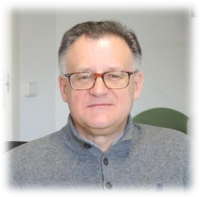 | José Marco Contelles studied chemistry at the Universidad Complutense de Madrid, where he obtained the award of PhD in 1984. After post-doctoral stages at Institut de Chimie de Substance Naturelles (CNRS, Gif-sur-Yvette, France, 1984-85), Département de Chimie Organique (Université de Genève, Genève, Switzerland, 1986), and the Department of Chemistry (Duke University, Durham, US, 1988-89), in 2004 he was appointed as Senior Research Scientist at the IQOG (CSIC, Madrid, Spain). He has been Invited Professor at the Université Paris VI, Université Jules Verne-Picardie (Amiens, France), Okayama University (Okayama, Japan), and University of Franche-Comté (Besançon, France). He has lectured twice on Gordon Conferences, in 2001 (“Carbohydrates”), and 2004 (“Organic Reactions and Processes”). In 2002 he was awarded with the French-Spanish award of the French Chemical Society. JMC has published 440 scientific contributions (408 Articles, 2 Books, 7 Journal issues as Associated Editor, 23 Chapters in books) and submitted 24 Patents. His interests include the design, synthesis and biological evaluation of new ligands for Alzheimer’s disease, and stroke. |
| Prof. Maria M. M. Santos University of Lisboa, Portugal 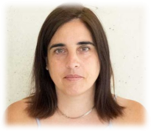 | M. M. M. Santos graduated in Applied Chemistry (Organic Chemistry) at the New University of Lisbon (UNL). In 2000, she started a PhD in the field of indole alkaloids synthesis (organic synthesis) at the UNL (2000-2004). In 2004, she was awarded a post-doctoral FCT fellowship to work in asymmetric synthesis at the University of Barcelona (Amat-Bosch group, Spain). In 2006, she joined the group of Medicinal Chemistry of the Faculty of Pharmacy of the University of Lisbon (FFUL) as a post-doctoral fellow (Rui Moreira group, Portugal). In 2008, she started her independent career at FFUL. Currently, M Santos is professor at FFUL and leader of the Medicinal Organic Chemistry Group (https://medorgchemlab.wixsite.com/medorgchemgroup) at the Research Institute for Medicines (iMed.ULisboa). Her research is focused on medicinal chemistry, and methodology development for drug discovery. From 2016 to 2020, she was member of the executive committee of the medicinal chemistry division of Portuguese Society of Chemistry (SPQ) and the Portuguese NAO liaison officer of the European Federation of Medicinal Chemistry (EFMC). Currently, she is member of the International Advisory Board of ChemMedChem (Wiley), member of the MSCA Doctoral Network OncoProTools (Protease‐guided tumor targeting tools to revolutionize cancer diagnosis and treatment) and coordinates a project based on the development of novel p53 small molecule activators. More information about her CV can be found at http://www.ff.ul.pt/~mariasantos. |
| Prof. Gianluca Sbardella University of Salerno, Italy 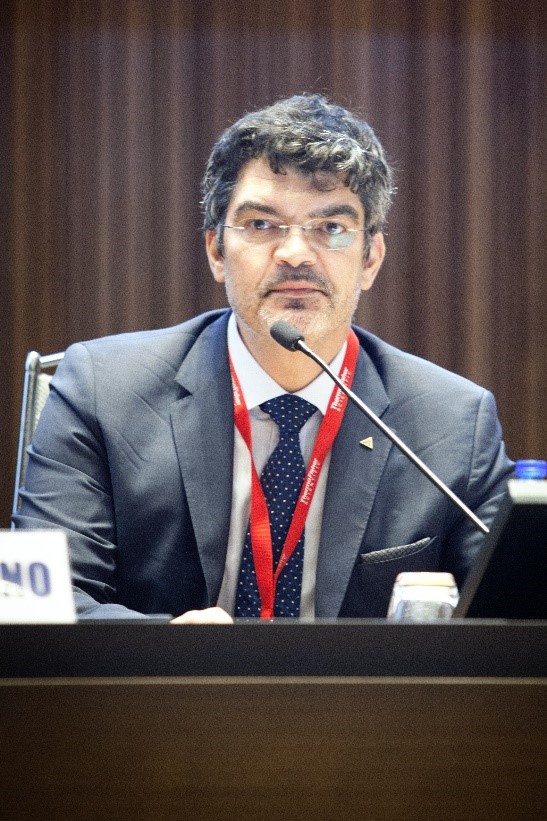 | Gianluca Sbardella received his M.Sc. (1993) from the University of Rome “La Sapienza” (Italy) and his Ph.D. (1997) from the same University. After postdoctoral stints at the Drug Chemistry Center of Italian National Research Center, Italian National Institute of Health, University of Rome “La Sapienza”, University of Siena, in 2001 he joined the Department of Pharmacy of the University of Salerno, where since 2016 he is Full Professor in Medicinal Chemistry. In 2004 he spent a sabbatical period as visiting professor at the Department of Chemistry & Biochemistry of UCLA in the group of M.E. Jung. In 1994 and 1998 Gianluca was awarded with the Italian Pasteur Institute “Istituto Pasteur-Fondazione Cenci Bolognetti” Award. In 1995 he was awarded with the Italian Federation of Chemical Industry (Federchimica) Award. In 2008 was awarded with the Farmindustria Italian National Award for Research Excellence in Medicinal Chemistry. In 2019 he received the Golden Seal of the Italian Chemical Society (Società Chimica Italiana – SCI). Starting from 2023, he is member of the Scientific Board of the SCI. His research regards most aspects of epigenetic drug discovery, spanning synthetic strategies, medicinal chemistry, chemical biology, biophysical techniques. He is Author of over 120 papers on high-impact international MedChem journals, 3 book chapters, 3 patents (PCT) and over 120 communications in international congresses, comprising 30 invited lectures. He has been Vice Rector for International Relations (2018-2022), Coordinator of the PhD program in Drug Discovery and Development (2011-2022), and member of the Intellectual Property and Technology Transfer Commission (2012-2020) of the University of Salerno. In 2017-2022 he was the National Representative for Italy in the Innovative Medicine Initiative (IMI2). He is member of the Scientific Advisory Board of the Chemical Probes Portal and member of the Editorial Board of ChemMedChem. In 2019-2021 he served as the President of the Medicinal Chemistry Division of the Italian Chemical Society (Divisione di Chimica Farmaceutica della Società Chimica Italiana). He is currently the Past President. In 2021 he joined the Executive Committee of the European Federation for Medicinal Chemistry and Chemical Biology (EFMC), first as a member and, starting from 2023, as the Secretary. He is also member of two EFMC working groups, Best Practices in Medicinal Chemistry WG and Chemical Biology WG. |
| Prof. Anne Sophie Voisin-Chiret Université de Caen Normandie, France 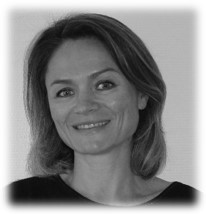 | Anne Sophie Voisin-Chiret obtained her PharmD (2002) and received her PhD from the University of Caen (2005), and after completing a postdoctoral period, she was appointed Lecturer in Medicinal Chemistry in the School of Pharmacy at the University of Caen (2007). Since September 2015, she has assumed the position of Prof of Medicinal Chemistry. Her research interests include medicinal chemistry in the field of protein-protein interactions, in order to design oligo(het)aromatic compounds that mimic proteins to fold into well-defined conformations, such as helices and β-sheets. Since 2012 she has been leading a research project dedicated to the study of the challenging class of protein-protein interfaces in order to design drug-like modulators of protein-protein interactions particularly in oncology and neurodegenerative diseases. Recently, she has focused her work on the design, synthesis and biological evaluation of proteolysis targeted chimeras (PROTACs). |